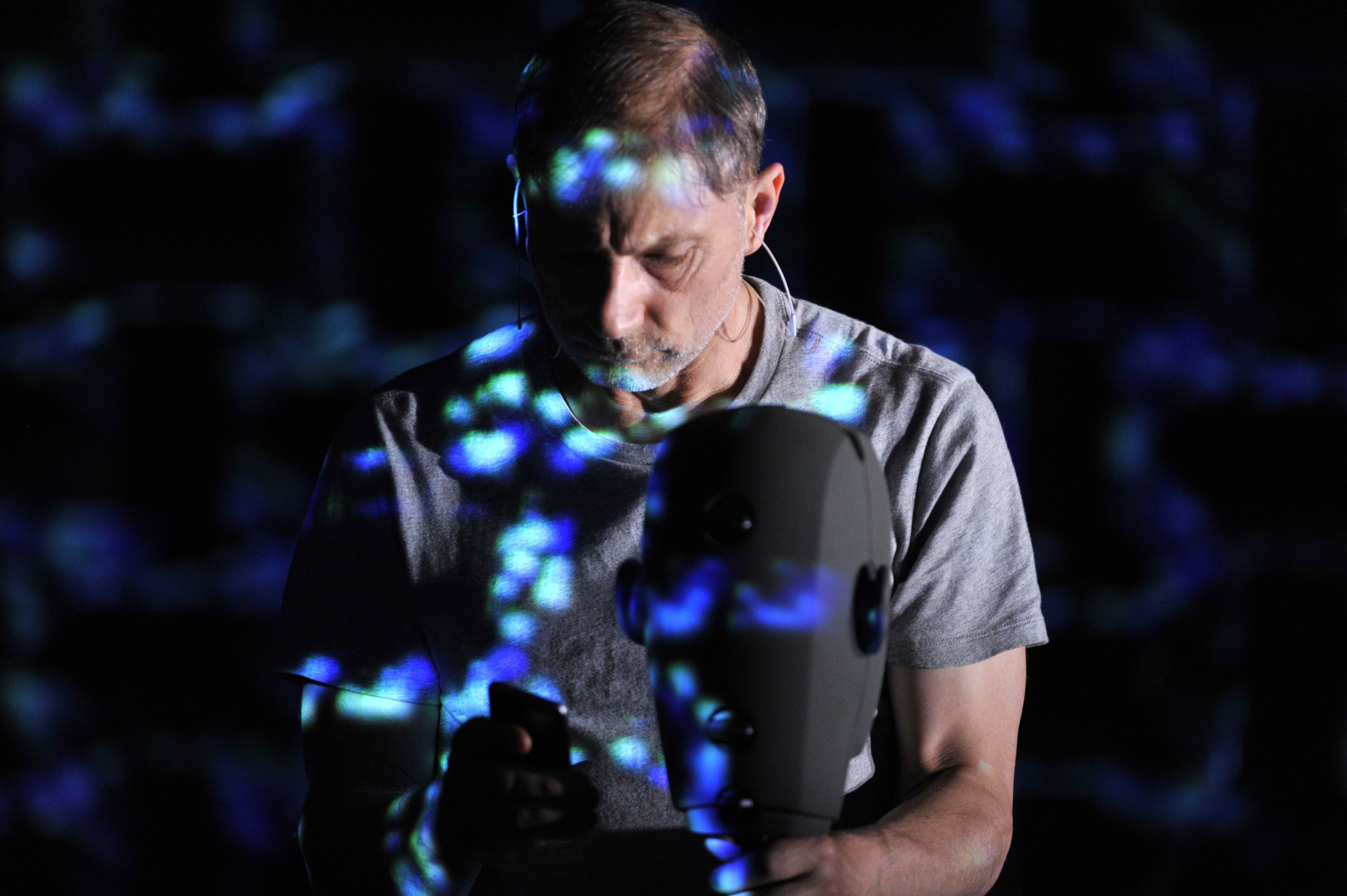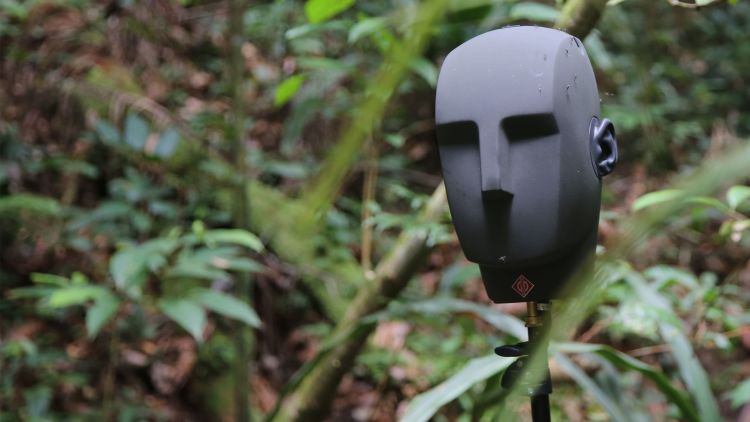Complicité's
The Encounter
Simon McBurney and Marcus du Sautoy discuss the role of consciousness in 'The Encounter', a theatrical retelling of the incredible true story of National Geographic photographer, Loren McIntyre and his hallucinogenic journey into in a remote area of Brazil in 1969

As The Encounter returns to the Barbican Theatre for the third time, following a hit Broadway run, we wanted to look further into the making of the production that has fascinated audiences since its premiere in 2016.
This is the true story of National Geographic photographer Loren McIntyre, lost in a remote area of Brazil in 1969, leading to a startling encounter that is to change his life forever. Simon McBurney’s solo performance threads scenes of his own life with details of McIntyre’s hallucinogenic journey, plunging the audience into a visceral inner voyage. As the mesmerising tale reaches its climax, this extraordinary tour de force asks urgent questions: about how we live and what we believe to be true.
We met with director and actor Simon McBurney and mathematician and Simonyi Professor for the Public Understanding of Science at the Oxford Univeristy, Marcus du Sautoy, to open the conversation about the role consciousness plays within the production – and how Simon’s experiences in Brazil contributed to the creation of The Encounter.
Continuing their conversation, Simon and Marcus discussed the connections between some of the key themes in The Encounter – storytelling, consciousness and time – and how both the Mayoruna and modern science understand and respond to these ideas.
Marcus du Sautoy: I think an important theme is this idea of storytelling and consciousness. There’s quite a lot of evidence that we’re almost reconstructing the input into a story and that’s what consciousness is.
Simon McBurney: The idea of story, the narrative, from our early conversations about The Encounter was something that linked me with this book. The book, Amazon Beaming, is on one level, an extraordinary and compelling narrative – a story. The interesting thing about it, is that this man, Loren McIntyre, goes in with a story, it’s a colonial story, he wishes to take something – he wishes to take photographs. Which doesn’t sound like taking something but it is in fact, appropriating the image of people for mass consumption. Of course what happens, critically, is that not only does he get lost in the forest but he loses his camera. And therefore he loses his story.
He has to begin to involve himself in the story, the narrative, of these people which he does reluctantly. But to his credit, he involves himself completely and survives it and discovers that is the only way to survive. By sinking himself so deeply into another narrative, what happens is this other narrative casts light on our narrative. So when you come back to the question of consciousness, the idea that we are discreet individuals who have a right to this, that brings you into a mind-set where you think you have a right to possess things.
'We don’t share a language, how can I feel him communicating?'

MS: When you gave me the book, there was a real challenge in it for me as a scientist, this thing called ‘beaming’. The book is called Amazon Beaming and there’s some point in which Loren McIntyre feels like he’s being communicated with – he hears a voice in his head. Telepathy, I guess, is a good name for describing the experience he has. What I love about the book is, Loren McIntyre, he’s a scientist at heart and he really questions this. This can’t be happening. We don’t share a language, how can I feel him communicating? Yet, as he examines this he can’t find an explanation. For me that was a really interesting challenge – how could that have happened? If our brain is just a network, then if we extend that network surely that extended network can have a consciousness? So I think modern science is providing perhaps the first hints at an explanation for, maybe, why spending so much time in the network of the tribe there was some level of communication going on - ‘beaming’.
SM: One of the things that is so interesting with Loren McIntye, or indeed when I walked into the forest, was that I was lost. I was lost because I didn’t know what anything was. The people that I was with, every single thing they had, that they could see, had a name. The moment it was named and known, the forest, as it were, began to communicate certain things to them. The more you understand and name those things, the more communicative the environment becomes. It’s not wrong to say it speaks, it communicates to you. If you are tuned in, you can hear things that you wouldn’t otherwise hear.
In the same way that you tune into music and understand that something is being said through a medium that isn’t language as we understand it. Or in our romantic encounters, where across the room you suddenly feel like you’re communicating with someone – certainly without any language as we understand it, and certainly in an interior way. And so when telling this story, this is a narrative on behalf of Loren McIntyre - words were appearing in his head, they were his words, but they came from a very powerful sensation.
MS: Sensation is really important as a word here, because artificial intelligence, trying to simulate our intelligence in a machine, really got stuck and we realised that what’s missing here is embodiment. We need to stick that intelligence inside a body that has sensual interaction with its environment and so the moves to try and replicate our intelligence, or create a new one, are being combined with sticking that inside a robot that has some interaction with the world. And I think there’s so much more than the 0s and 1s inside a machine. Yes, the emotional and physical interaction may be reducible to the 0s and 1s but without that, we’re missing so much.
I think the other theme that emerged, perhaps later on, was the theme of time. And that of course is a theme that’s so important in the story.
SM: What is time?
MS: Another big question that science is unable to answer at the moment. You might say, come on, we know what time is, it’s that which ticks on our watch, it’s what stops things happening at once but as soon as you start saying that you’re becoming circular because you’re using time in the definition. So modern science is struggling.
'If you are tuned in, you can hear things that you wouldn’t otherwise hear...'

SM: We have the impression that we are here in present time but with every word that I’m saying we are moving into the past. And the only way that you manage to hold on to a sense of time again, is through a story. Because I am telling a story now – I’m telling the story of Simon McBurney – and that is giving us a sequence in time which makes us aware of it. At the same time, we think of it as present time.
MS: I think consciousness is really related to this. Consciousness has given us the ability to do mental time travel, that’s probably its evolutionary advantage to us - that we can look into the future and make plans. Many animals that we believe don’t have the same level of consciousness as us, they live in the moment – they are mindfulness personified – but we spend so much of our time not in the present, either telling stories of the past or planning for the future. But it has a cost, of course, looking into the future means that we can see our mortality, we know we’re going to die, we know there’s an ending, and that is an expensive cost, actually, for this ability to have consciousness.
SM: A really, really revealing use of the word when you say ‘expensive cost’ when you’re relating it to death. In our society, we see things in financial terms, and acquisitive terms and possessive terms and this is for me one of the themes at the heart of The Encounter; which is, if you don’t see consciousness in that way, if you see yourself as continuous and contiguous with the world around you, and if you see yourself in terms of a very, very deep past, before you were there, and a far future which has nothing to do with this physical substance - under those circumstances, death is alright. It has nothing to do with cost and expense, it is part of the process of the interaction of the world. And you become part of the world, which will then become part of the people, if you see yourself as inseparable from nature.
SM: In the piece there is a line from my cousin, who is an oceanographer, who says something very simple, but it resonates with me, and it’s that we’re all part of nature and we cannot escape it. Just as we cannot escape the planet. One of our problems is perhaps the feeling that we are outside nature, that we have invented a narrative in which we see ourselves as separate from nature. How shocking it would be if I started to take my clothes off right now and sat here naked! But that is in fact who I am. We have constructed these layers of narrative around us.
And that is the cost, much more than the cost of dying – this is the consequence of seeing ourselves as separate. ‘You can throw that away’ – but there is no away. Our shit remains here. We cannot escape it. And what fascinated me within this story was the encounter, with this man and his culture, and it’s important that it’s a male possessive point of view that is fundamentally called into question, and I think it fundamentally changed him. As a consequence, he saw things in a very, very different way.
One of the consequences of our civilisation is we break everything up – everything is made into distinct entities, and one of the things Loren McIntyre had to come to terms with was the interconnection of everything. When everything is broken down for him, he calls it into question.
As he said himself, he never saw the world in the same way again.
Further Reading
Visit Complicité's The Encounter resource website for more discussions, interviews and information about the making of The Encounter, from Simon McBurney's diaries during his visit to the Amazon to meet the Mayoruna, the range of people he spoke to during the creation of the work including science writer, Rita Carter; psychologists Chris and Uta Frith; and explorer John Hemming.

The Encounter
Complicité/Simon McBurney
This is the true story of National Geographic photographer Loren McIntyre lost in a remote area of Brazil in 1969, leading to a startling encounter that is to change his life forever. Simon McBurney’s solo performance threads scenes of his own life with details of McIntyre’s hallucinogenic journey, plunging the audience into a visceral inner voyage. As the mesmerising tale reaches its climax, this extraordinary tour de force asks urgent questions: about how we live and what we believe to be true.
Presented by the Barbican. A Complicité co-production with the Barbican, Edinburgh International Festival, Onassis Cultural Centre – Athens, Schaubühne Berlin, Théâtre Vidy-Lausanne and Warwick Arts Centre.


